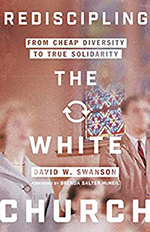By Grace Brown
 The response of white Christians to address racial blind spots and assumptions often defaults in white communities and churches to try to become more racially diverse to solve the problems. Swanson asserts that the segregation within white Christianity is not actually a diversity problem, but really a discipleship problem. American culture disciples white Christianity toward racial segregation and injustice. Swanson encourages white Christians to honestly assess the damage done by misguided forms of discipleship. He then outlines a rethinking of discipleship practices, including new habits, teaching, and uncommon friendship, that can lead us into authentic solidarity as members of the diverse body of Christ. The reader finishes the book having reckoned with painful truths, bringing forth hope and a reorientation to the diverse kingdom of God.
The response of white Christians to address racial blind spots and assumptions often defaults in white communities and churches to try to become more racially diverse to solve the problems. Swanson asserts that the segregation within white Christianity is not actually a diversity problem, but really a discipleship problem. American culture disciples white Christianity toward racial segregation and injustice. Swanson encourages white Christians to honestly assess the damage done by misguided forms of discipleship. He then outlines a rethinking of discipleship practices, including new habits, teaching, and uncommon friendship, that can lead us into authentic solidarity as members of the diverse body of Christ. The reader finishes the book having reckoned with painful truths, bringing forth hope and a reorientation to the diverse kingdom of God.
Can you share a quote from the book that was meaningful to you?
As a mom of 4 kids and a Sunday School teacher for many years, I think a lot about education and guiding the spiritual lives of children. I know from my own life that it is generally easier to teach children than it is to reteach adults!
For this reason, this quote from the chapter on practicing children's ministry of reconciliation really jumped out at me: "But because our goal is not cheap diversity but true solidarity, we can look around our white churches with our beloved children and see enormous possibilities. These young people have the God-given capacity to represent the racial justice and reconciliation of the kingdom of God, not someday but today, as valued members of the church…[P]erhaps no other of our reimagined discipleship practices feels so fraught with danger. But neither does any other hold so much hopeful possibility." (page 131)
I so long and pray for each of my children (and all the children in our church) to be formed for the journey of following Jesus into the reconciled kingdom of God.
What was a new thought or a key takeaway?
My key takeaway from this book was deep self-reflection and many "ah ha" awareness moments that now push me off in a new direction. I am reconsidering how I have been discipled over the years in both healthy and damaging ways. As a Christian who was born and raised in the United States, I lament the ways that I am conformed to this world. I was discipled myself and I also discipled others in ways that were blinded unknowingly by my own cultural practices.
What action will you take as a result of reading this book?
This book helps me identify and call out faulty discipleship practices shaped by American culture. And identify and call it out in me and my lived spaces as well! I'm energized by the author's encouragement that "we don't have to wait [for diversity or something else to happen]…we can do this good work right now, wherever we find ourselves." Too often, I find myself waiting for the perfect or right conditions, but God calls me to the here and now to chart a new course. One specific action I am taking is to raise my voice at my children's school on behalf of all children when I prayerfully see injustice or blind spots in the school curriculum or school culture.
Is there anything else you'd like to share about this book?
This book reminded me that discipleship is costly; if we don't know or feel that costliness, we are merely conforming to the consumer-oriented pattern of our society. I am deeply grateful for this reminder today as I clumsily but joyfully continue to follow Jesus in the work of racial reconciliation.
Book Details
Published: 2020
Author: David W. Swanson
Author Info: Author Page on Amazon
Formats: View Book on Amazon
Pages: Our Book Page
